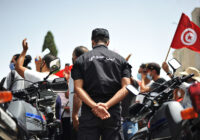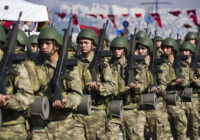The legacy of the Arab Uprisings is one that has encouraged a willingness to pose questions, put issues on the table and challenge established norms.
Pressured by human rights and trade union activists leveraging Qatar’s exposure as a World Cup host, and influenced by subtle changes sparked by popular Arab revolts in recent years, young Qataris are pushing the envelope, broaching publicly hitherto taboo subjects like homosexuality, women’s dress codes and citizenship.
The pushing of the envelope may be the most marked in Qatar because the prospect of the 2022 FIFA World Cup in the Gulf Cooperation Council (GCC) state has focused attention on how it will deal with the large influx of soccer fans from less conservative and non-Muslim societies. It is, nonetheless, reflective of a wider trend in the region in which youth and women are seeking to broaden norms of public and social behavior.
The trend is further driven by the winds of change sweeping the GCC as the Middle East’s oil-rich nations—which are unable to continue offering cradle-to-grave security and guaranteed public sector employment—are forced to rewrite their social contracts that justified autocratic rule.
What’s Changed?
Formally and legally nothing has changed, yet individual attempts to push the envelope are indicative of a desire among various societal groups to have their issues publicly discussed and addressed, and a willingness to run greater risk of public attack and humiliation in achieving their goals.
Writing in Doha News, Alnood al-Thani boiled the various debates involving the criticism of women who fail to cover their hair while traveling abroad and those who engage in overseas charity activities in mixed gender groups—and a Qatari homosexual who described in an article what it means to be gay in a society that condemns sexual diversity, as well as discussions about who should be entitled to citizenship in a country where foreigners account for the overwhelming majority of the citizenry—down to their essence of what it means to be Qatari.
“There isn’t one definition of being a Qatari nor is there one characteristic that makes you Qatari. The majority of the population of Qatar is not from Qatar, and it’s hard to define what it means to be Qatari … There is not a single definition of being Qatari and forcing someone to cover their hair or hide who they are isn’t upholding the image of Qatari society … There is nothing benevolent or respectful in people shaming men and women into complying with their views,” al-Thani wrote.
Al-Thani’s article appeared days after an uproar erupted because another Qatari woman, writer and businesswoman Maryam al-Subaiey, appeared unveiled with make-up and her long, curly black hair flowing freely on French television to discuss how Qatari women perceive themselves.
Like al-Subaiey, 28-year-old Saudi pharmacy student Bashayer al-Shehri and other young women in the Kingdom of Saudi Arabia are challenging the country’s strict dress codes. Al-Shehri decided to shed the black face veil she wore in public throughout her adult life and to simply wear a headscarf.
“I just decided that society is changing and I’m going to just try to see, and it was so easy. I didn’t really notice any difference of treatment of people and how they perceive me,” al-Shehri told Bloomberg News.
Curbs on Saudi Arabia’s notorious religious police as part of a bid to be more attentive to youth concerns and ease restrictions on women encourage those like al-Shehri. Similarly, 14,000 Saudi women have petitioned for King Salman to end male guardianship, which forces women to get a male relative’s permission to travel and, in many cases, study or work.
The women activists are beginning to get traction. A senior member of Saudi Arabia’s top Muslim clerical body, Sheikh Abdullah al-Manea, appeared to support the petition, saying the guardianship should apply only to marriage, while Saudi Arabia’s Shura or Advisory Council is expected to discuss “suitable conditions” under which women would be allowed to drive.
In early October, gender segregation was all but absent with men and women clapping side-by-side as New York-based theatrical group iLuminate took the stage in Riyadh as part of Deputy Crown Prince Mohammed Bin Salman’s effort to loosen restrictions on music, dance and theater.
Two years earlier, a trip by young Qatari men and women to the Amazon rainforest to build a school for the poor sparked protests because the women were not covered in abayas (robe), and they had traveled with men who were not relatives.
Homosexuality in the Arab World
Similarly, Majid al-Qatari, a pseudonym for a Qatari homosexual, sparked outrage by writing an article in which he described what it meant to be gay in the Gulf state. Al-Qatari noted that many had lauded the June 2016 attack on a gay bar in Orlando, Florida, describing homosexuals as “God’s cursed people.”
 Fair Observer provides you deep and diverse insights for free. Remember that we still have to pay for servers, website maintenance and much more. So, donate now to keep us free, fair and independent.
Fair Observer provides you deep and diverse insights for free. Remember that we still have to pay for servers, website maintenance and much more. So, donate now to keep us free, fair and independent.
“It is very jarring living here, it is traumatizing to see that you are the cause of your parents’ anguish, that you are shaming your family. It is a constant onslaught, and it is killing me. It has caused irreparable damage to my mental health. I wouldn’t have chosen to have been born in a place where my life is tantamount to my death. There is no prospect or future for me here — no normalcy,” al-Qatari said.
In another challenging taboo, young Qataris asked on Twitter why professionals such as doctors and engineers who contribute to Qatar’s development are denied citizenship while athletes competing internationally for the GCC state are awarded nationality to be able to do so.
All these issues—women’s rights; lesbian, gay, bisexual and transgender rights; and foreigners’ rights—are ones that were first publicly raised by international human rights and trade union activists after Qatar was awarded the World Cup in late 2010. The pressure from the activists appears to be now jellying with a greater willingness of Gulf youth to publicly question norms and the need of rulers to upgrade their autocracies as a way of ensuring survival.
Gulf youth may not want a repeat of the 2011 Arab Uprisings that, except for Tunisia, have largely been smoldered in blood. The revolts’ legacy is, nonetheless, one that has encouraged a willingness to pose questions, put issues on the table and challenge established norms. It is an environment to which debate about the 2022 World Cup in Qatar can only contribute.
The views expressed in this article are the author’s own and do not necessarily reflect Fair Observer’s editorial policy.
Photo Credit: Joel Carillet
Support Fair Observer
We rely on your support for our independence, diversity and quality.
For more than 10 years, Fair Observer has been free, fair and independent. No billionaire owns us, no advertisers control us. We are a reader-supported nonprofit. Unlike many other publications, we keep our content free for readers regardless of where they live or whether they can afford to pay. We have no paywalls and no ads.
In the post-truth era of fake news, echo chambers and filter bubbles, we publish a plurality of perspectives from around the world. Anyone can publish with us, but everyone goes through a rigorous editorial process. So, you get fact-checked, well-reasoned content instead of noise.
We publish 2,500+ voices from 90+ countries. We also conduct education and training programs
on subjects ranging from digital media and journalism to writing and critical thinking. This
doesn’t come cheap. Servers, editors, trainers and web developers cost
money.
Please consider supporting us on a regular basis as a recurring donor or a
sustaining member.
Will you support FO’s journalism?
We rely on your support for our independence, diversity and quality.






